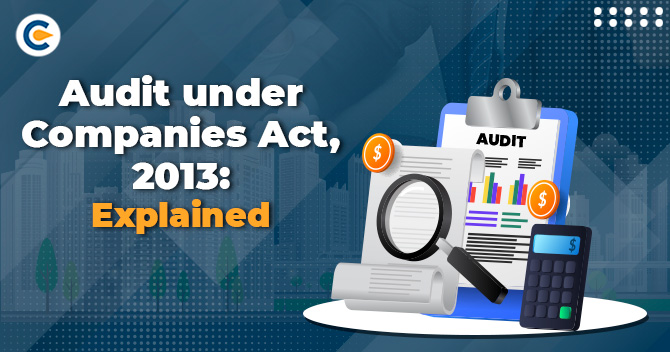An audit is an independent form of examining any company’s financial position irrespective of its size and legal structure. The Audit is conducted to express an opinion thereon, which helps report and determine an accurate and fair view of a company’s financial position and operating result. The current write-up throws light on the audit under Companies Act, 2013.
Regulations around Audit under Companies Act, 2013
As required for Audit under Companies Act, 2013, every company shall prepare a financial statement ending 31st March every year. Such financial statements must be given an accurate and fair view of the company’s financial affairs and comply with the accounting norms notified by the central government under Section 133 of the Companies Act. The company’s financial statement must also be prepared in the form and format that may be laid down for a specific type of company.
The expression financial statement required for Audit under Companies Act, 2013 shall include-
- Profit & loss account, or in the case of Non-profit organization, and income & expenditure account Balance sheet
- Cash flow statement
- A statement for changes in shares, if applicable. &
- An explanatory note attached to, or constituting part of, any document referred
Appointments of Auditors under Companies Act, 2013
To conduct an audit under the Companies Act, 2013, the first auditor must be appointed by the BODs within 30 days from the company’s date of incorporation. Here, an auditor means a-
- A Chartered accountant or
- A firm of chartered accountants, who are qualified to be the company’s auditor and who have given his approval to be appointed as auditor of the company.
However, if the Board of Directors fails to appoint the first auditor o the company, the Board shall intimate the company member who can appoint the first auditor within 90 days of such EGM.
Appointment of Subsequent Auditor
In the first Annual general meeting, the auditor needs to be appointed to hold office for five years. However, the auditor’s appointment must be ratified in every subsequent annual general meeting.
Persons Not eligible for an Audit under Companies Act, 2013
Below mentioned individual shall be ineligible for appointment as an auditor of a company –
- A body corporate other than an LLP registered under the Limited Liability Partnership Act, 2008.
- An employee or officer from the company.
- A person who is a partner or employed of an employee or director of the company.
- A person who is a family member or friend.
Types of Audits under Companies Act, 2013
As per the Companies Act,2013, an attempt has been made to cover each aspect of corporate functioning under Audit by prescribing various types of audits-
Internal Audit under Companies Act, 2013
Internal Audit is an independent service to examine a company’s internal controls, business practices, processes, and methods. An internal audit helps ensure compliance with the various laws applicable to a company.
Secretarial Audit under Companies Act,2013
As per the Companies Act,2013, A Secretarial Audit is an audit to examine the compliances of various regulations and various other laws applicable to the companies. A Secretarial Audit is an audit where the auditor discloses an opinion as
To whether persist relevant systems and processes in the company are in accordance with the size and functioning of the company. Also, the auditor monitors and examines compliance with applicable laws, rules, regulations, and guidelines.
As per Section 204, Companies Act, 2013 Read with rule 9 of the Companies (Appointment and Remuneration of Managerial Personnel) Rules, 2014 requires that-
- All Listed Company,
- Public Company having Paid-up capital of 50 crores or more, or turnover of 250 crores or more,
- Any private company serving as a subsidiary of a public company that falls into the categories mentioned above shall conduct a Secretarial Audit.
Note: A secretarial audit is obligatory if any of the above requirements are met.
Statutory Audit under the Companies Act,2013-
Section 143 of the Companies Act,2013[1] entails provisions regarding powers and duties of auditors. The statutory auditor shall present a report to the company’s shareholders on the Books of accounts and financial documents examined by him.
A statutory audit is an audit mandated by a Statute that ensures that the accurate and fair view of the book of accounts is presented to the Regulators & the Public. Unlike internal Audits, Statutory Audits are not optional and must be performed if a company satisfies specific criteria.
The Statutory Auditor will have access to books of accounts and vouchers etc., constantly, and he has any authority to ask for further information from company officers, if necessary. The auditor in his report must clarify, besides other things, whether the financial statements represent an accurate and fair picture of the company’s affairs as at the end of the financial year.
Note: In case of any qualifications in the audit report, the reason must be stated in the report.
Branch Audit under Companies Act, 2013
Branch office Accounts are audited by-
In case of Local Branches-
- Company’s Auditor
- Another Qualified Auditor
In case of Foreign Branches-
- Company’s Auditor
- Another Qualified Auditor
- An individual qualified to audit accounts according to the laws of that country.
The Branch Auditor shall prepare a review report on the BOA of the branch examined by him and shall send the report to the company’s auditor.
Cost Audit under Companies Act, 2013
Cost Audit is the method to verify the cost-records of products or services that contain their manufacturing cost, labour cost, overheads, etc. Cost Audit is a genuine review of the accounting and records to be maintained according to Cost Accounting Standards.
Section 148(3) of Companies Act 2013 states that-
- Only a Practicing Cost Accountant or a firm of cost accountant can be appointed as cost auditor and shall conduct cost audit of the company.
- The Board of Directors shall appoint the Cost Auditor.
- The Cost audit shall be conducted simultaneously with the Audit under section 143 of the companies act,2013.
- The remuneration of the cost auditor shall be decided by the shareholders in such a manner as may be prescribed.
Note: No individual appointed under section 139 as an auditor of the company shall be appointed to audit cost records Rule 14 of Companies (Audit and Auditor) Rules, 2014.
Conclusion
In view of this write-up, we can conclude that as per the Audit under Companies Act 2013. An auditor shall examine and verify the company’s financial statements to depict the company’s accurate and fair financial position. It is the responsibility of an auditor to provide shareholders and regulators with confidence in the efficacy of the company’s financial position.
Read our Article:Register of Members under the Companies Act, 2013











